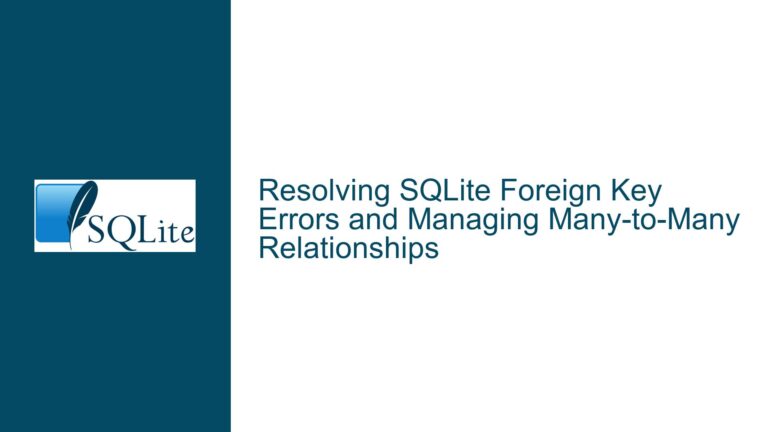PRAGMA foreign_keys = OFF Fails to Disable ON DELETE CASCADE in Transactions
Understanding PRAGMA foreign_keys Behavior with ON DELETE CASCADE in Transactions
Issue Overview: Foreign Key Enforcement Persists Despite PRAGMA foreign_keys = OFF
The core issue revolves around the interaction between SQLite’s PRAGMA foreign_keys directive and foreign key actions such as ON DELETE CASCADE when executed within a transaction. Users expect that disabling foreign key enforcement via PRAGMA foreign_keys = OFF will suppress all foreign key constraints, including cascading deletes. However, in certain scenarios—particularly when the pragma is issued inside an active transaction—the database engine continues to enforce ON DELETE CASCADE rules. This behavior creates inconsistencies in data integrity checks, especially when triggers or application logic depend on bypassing cascading actions.
The problem manifests when:
- A transaction is initiated (
BEGIN TRANSACTION). PRAGMA foreign_keys = OFFis executed within the transaction.- A
DELETEoperation on a parent table triggersON DELETE CASCADEdespite the pragma.
This violates the expectation that disabling foreign keys should prevent cascading deletes. The issue is sensitive to SQLite versions and the placement of the pragma relative to transaction boundaries. For example, in SQLite 3.9.2, cascading deletes may still execute even with foreign keys disabled inside a transaction, whereas in version 3.44.0, the pragma behaves as expected when applied correctly.
Possible Causes: Transaction Boundaries and Foreign Key Enforcement
Three primary factors contribute to this unexpected behavior:
Transaction Isolation of PRAGMA Statements
SQLite restricts modifications to the foreign key enforcement state (PRAGMA foreign_keys) during an active transaction. As documented, foreign key settings cannot be altered once a transaction is in progress. If aPRAGMA foreign_keys = OFFis issued afterBEGIN TRANSACTION, SQLite ignores it and retains the foreign key state active at the transaction’s start. This is a deliberate design choice to maintain transaction consistency.Default Foreign Key Configuration
SQLite builds may have foreign keys enabled by default if compiled with-DSQLITE_DEFAULT_FOREIGN_KEYS=1. If the pragma is not explicitly set toOFFbefore starting a transaction, foreign key constraints—including cascading deletes—remain active regardless of later pragmas within the transaction.Trigger Logic Conflicts
Triggers that manually enforce referential integrity (e.g., updating reference counts or cascading deletes) may inadvertently conflict with foreign key constraints. For example, a trigger designed to delete child rows might execute alongside anON DELETE CASCADEconstraint, leading to redundant or unintended deletions.
Resolving the Issue: Step-by-Step Fixes and Best Practices
To address the problem, follow these steps:
Step 1: Validate PRAGMA Placement Relative to Transactions
Ensure PRAGMA foreign_keys = OFF is executed before starting a transaction. Modify the script structure to:
PRAGMA foreign_keys = OFF; -- Set outside transaction
BEGIN TRANSACTION;
-- Execute DELETE operations here
COMMIT;
This guarantees that foreign key enforcement is disabled before the transaction begins.
Step 2: Verify SQLite Compilation Flags
Check whether foreign keys are enabled by default in your SQLite build:
PRAGMA compile_options;
Look for SQLITE_DEFAULT_FOREIGN_KEYS in the output. If present, foreign keys are enabled by default, requiring explicit PRAGMA foreign_keys = OFF statements before transactions.
Step 3: Audit Trigger Logic for Redundant Cascading Actions
Review triggers that perform cascading deletions or reference count updates. For example, a trigger like:
CREATE TRIGGER TRG_CREATORS_DEL AFTER UPDATE OF REF_CNT ON CREATORS
FOR EACH ROW WHEN NEW.REF_CNT = 0 BEGIN
DELETE FROM CREATORS WHERE ID = OLD.ID;
END;
might conflict with ON DELETE CASCADE if foreign keys are unintentionally enabled. Disable such triggers or conditionally execute them based on the foreign key state.
Step 4: Test with Minimal Scripts Across SQLite Versions
Isolate the issue using a minimal test case:
CREATE TABLE parent(id INTEGER PRIMARY KEY);
CREATE TABLE child(id INTEGER REFERENCES parent(id) ON DELETE CASCADE);
INSERT INTO parent VALUES(1);
INSERT INTO child VALUES(1);
PRAGMA foreign_keys = OFF; -- Execute outside transaction
BEGIN TRANSACTION;
DELETE FROM parent WHERE id = 1;
COMMIT;
If the child row is deleted, foreign keys are still active. Repeat the test with PRAGMA foreign_keys = OFF placed inside the transaction to observe version-specific behavior.
Step 5: Use Connection-Specific Foreign Key Settings
Ensure foreign key pragmas are applied per database connection. If connection pooling is used, reset the pragma state for each new connection to avoid inheritance of stale settings.
Step 6: Update SQLite to a Recent Version
Versions after 3.20.0 (2017-08-01) include fixes for edge cases in foreign key enforcement. Test the behavior in 3.44.0 or newer, where the pragma’s interaction with transactions is more consistent.
Step 7: Implement Defensive Schema Design
Avoid relying solely on PRAGMA foreign_keys for critical data integrity. Use triggers or application-layer checks to enforce rules when foreign keys are disabled. For example:
CREATE TRIGGER TRG_PARENT_DEL_INSTEAD INSTEAD OF DELETE ON parent
BEGIN
DELETE FROM child WHERE id = OLD.id;
DELETE FROM parent WHERE id = OLD.id;
END;
This ensures cascading deletes occur even when foreign keys are off, but requires manual maintenance.
By systematically addressing transaction boundaries, SQLite compilation settings, and trigger design, users can resolve conflicts between PRAGMA foreign_keys = OFF and ON DELETE CASCADE. Always validate pragma placement and test across SQLite versions to ensure consistent behavior.






